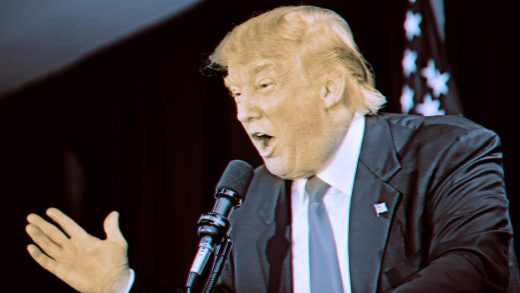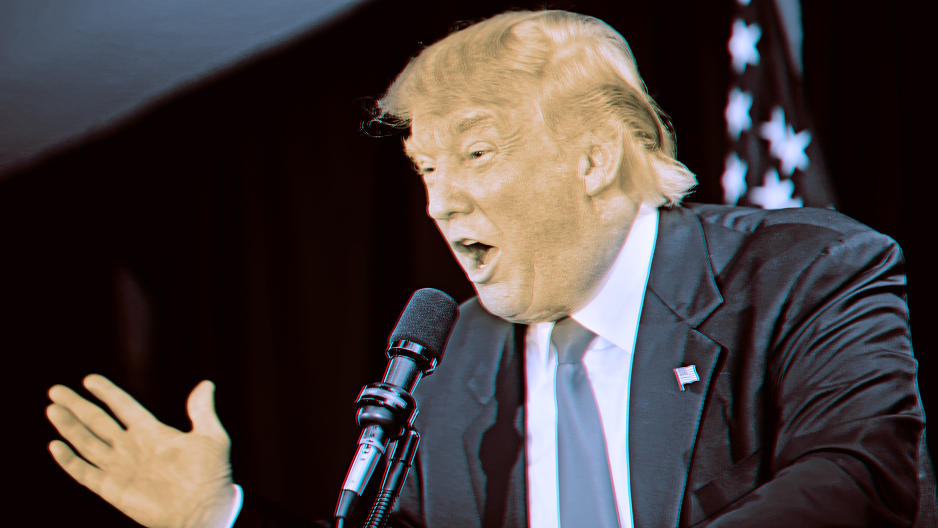Where Will Trump Fall On The Encryption Debate? Tough Call
Judging by Donald Trump’s statements about Apple on the campaign trail, you’d think privacy advocates and tech company attorneys would be nervous about attacks on encryption in 2017. They probably are—and they should be. But what the president-elect actually thinks about the matter is a mystery. As we’ve seen during his transition process, what he said while campaigning may not fit into his plans for governing. So figuring out where he might land on the encryption debate takes a bit of guesswork.
First, let’s recap. Apple became the poster child for strong encryption this year when the FBI publicly demanded the company hack into an iPhone to access evidence on the 2015 terrorist attack in San Bernardino. Apple held the line, explaining repeatedly that if it were to weaken the encryption on one phone, the encryption on all phones of that type would be weakened, too. Decrypting one iPhone would in effect create an opening through which some clever bad apple could wreak all kinds of chaos. The FBI eventually withdrew its request for a warrant to compel Apple to help.
While other presidential candidates were circumspect on the matter, Trump came down strongly on the side of law enforcement, stating that Apple should unlock the phone in question. “Who do they think they are!?” he said. Apple eventually won the PR war, successfully spreading the message that weakening encryption hurts everybody and works against both national security and law enforcement interests.
The Argument That Trump Will Uphold Strong Encryption
Despite his earlier comments, Trump may not buy the FBI’s argument that tech companies build encryption “backdoors” into their products, either. Over the past several weeks, Trump has shown no compunction of reversing himself on his campaign promises. (He has softened his tone on immediately dismantling Obamacare, for instance.) He continues to appear impulsive and unpredictable, seemingly glomming onto the opinion of the last person he spoke to. Trump’s handlers’ advice for those of us trying to make sense of it all? “Take him seriously, not literally.”
And there are more concrete indicators that Trump could become pro-encryption. Earlier this month, Tim Cook sat in a room with Trump and a bunch of other tech leaders to talk about how Silicon Valley and the government can work together. Facebook’s Sheryl Sandberg was there. So was Peter Thiel, who we can officially call the Trump Whisperer.
Thiel isn’t likely to advise Trump to take any action that might harm encryption. Thiel serves on the board at Facebook, and Facebook’s business relies on strong encryption as much as Apple’s does, if not more.
There’s also a good chance that weak encryption’s biggest proponent, FBI director James Comey, won’t be leading the FBI for much longer, since Trump has criticized him in the past. When asked on 60 Minutes if he would keep Comey on as FBI director, the president-elect was offered an evasive, “I’m not sure.” (Comey, of course, might have been the single most damaging factor in Hillary Clinton’s surprise defeat on November 8.)
The Argument That Trump Will Weaken Encryption
On the other hand, Trump might decide that encryption backdoors are a good idea. If he does, he may go nuclear—that is, use executive orders—to make tech companies comply.
“It is entirely possible for the new administration to totally circumvent the traditional channels of statute in the agency regulation process by going the route of executive orders or presidential policy directives,” tech attorney and encryption expert Peter Fu said in an email to Fast Company.
Fu says that despite outward appearances, Trump has a very deep data science bench working for him, and they may decide to put their expertise and influence behind law-enforcement goals. “I think this president, more than any other president since Nixon, will test the outer boundaries of executive action, particularly in the world of digital security.” Trump might sign an executive order stating that tech companies must build encryption backdoors into their products (hardware or software), and shoulder the significant expense of doing so.
And if he’s like Nixon, Trump might work behind the scenes to pressure tech companies into providing encryption backdoors, says Fu. Meetings with tech leaders would take place in secret and the public would never know.
Or Trump might connect the immigration issue with the encryption issue and insist that encryption backdoors are crucial for monitoring or investigating immigrants the government suspects have bad intentions.
At the moment, the encryption issue is on “simmer” in the capital, as one industry source said. No major encryption bills are circulating during Congress’s holiday recess. But if, after Trump takes office on January 20, any of those scenarios come to pass, tech company lawyers and lobbyists can look forward to a busy 2017 as they fight against backdoors. Lobbying by large tech companies and their associations was already intense through much of 2016, and encryption is still at the top of tech companies’ policy agendas for next year. With the trust of their customers at stake, Apple and Facebook would spare no expense in a battle that would be the biggest tech policy fight in years.
For its part, Apple hopes that encryption never comes to a boiling point like it did earlier this year. If it does, it might end up being the issue that defines Tim Cook’s tenure as CEO.
Fast Company , Read Full Story
(15)



